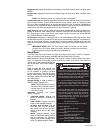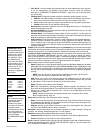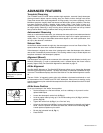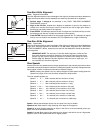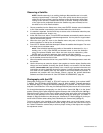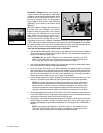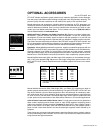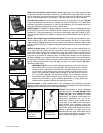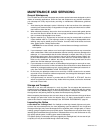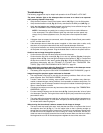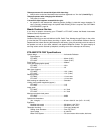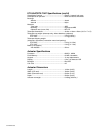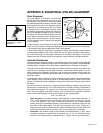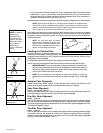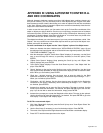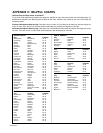
General Maintenance
The ETX-60AT and ETX-70AT telescopes are precision optical instruments designed to yield a
lifetime of rewarding applications. Given the care and respect due any precision instrument,
your telescope will rarely require factory servicing or maintenance. Maintenance guidelines
include:
1. Avoid cleaning the telescope’s optics. A little dust on the front surface of the telescope’s
correcting lens causes virtually no degradation of image quality and should not be consid-
ered reason to clean the lens.
2. When absolutely necessary, dust on the front lens should be removed with gentle strokes
of a camel hair brush or blown off with an ear syringe (available at any pharmacy
). Do not
use a commercial photographic lens cleaner.
3. Organic materials (e.g., fingerprints) on the front lens may be removed with a solution of
3 parts distilled water to 1 part isopropyl alcohol. A single drop of biodegradable dish-
washing soap may be added per pint of solution. Use soft, white facial tissues and make
short, gentle strokes. Change tissues often.
CAUTION: Do not use scented, colored, or lotioned tissues as damage could result
to the optics.
4. If your telescope is used outdoors on a humid night, telescope surfaces may accumulate
water condensation. While such condensation does not normally cause any damage to the
telescope, it is recommended that the entire telescope be wiped down with a dry cloth
before being packed away. Do not, however, wipe any of the optical surfaces. Rather, sim-
ply allow the telescope to sit for some time in warm indoor air, so that the wet optical sur-
faces can dry unattended. In addition, the dust cap should not be placed back on to the
optical tube until the telescope is thoroughly dry.
5 If your telescope is not to be used for an extended period, perhaps for one month or more,
it is advisable to remove the six AA-size batteries from inside the drive base. Batteries left
installed for prolonged periods may leak, causing damage to the telescope’s electronic cir-
cuitry. See “HOW TO ASSEMBLE YOUR TELESCOPE,” page 10.
6. Do not leave your telescope outdoors on a warm day or inside a sealed car for an extend-
ed period of time. Excessive ambient temperatures can damage the telescope’s internal
lubrication and electronic circuitry.
7. A (English-format) hex wrench is provided with the ETX-60AT or ETX-70AT. Use the
wrench to tighten the set-screws of any knobs which may loosen, such as the horizontal
lock knob or focus knob.
Storage and Transport
When not in use, store the telescope in a cool, dry place. Do not expose the instrument to
excessive heat or moisture. It is best to store the telescope in its original box with the vertical
and horizontal locks (
6 and 9, Fig. 1) in the unlocked positions. If shipping the telescope, use
the original box and packing material to protect the telescope during shipment.
When transporting the telescope, take care not to bump or drop the instrument; this type of abuse
can damage the optical tube and/or the objective lens. It is highly recommended to use the
optional Hard Case to transport the telescope. See “OPTIONAL ACCESSORIES,” page 25.
Inspecting the Optics
A Note About the “Flashlight Test": If a flashlight or other high-intensity light source is point-
ed down the main telescope tube, the view (depending upon the observer’s line of sight and
the angle of the light) may reveal what appears to be scratches, dark or bright spots, or uneven
coatings, giving the appearance of poor quality optics. These effects are only seen when a high
intensity light is transmitted through the lens or reflected off the mirror, and can be seen on any
high quality optical system, including giant research telescopes.
The optical quality of a telescope cannot be judged by the “flashlight test"; the true test of opti-
cal quality can only be conducted through careful star testing.
MAINTENANCE AND SERVICING
Maintenance 27



